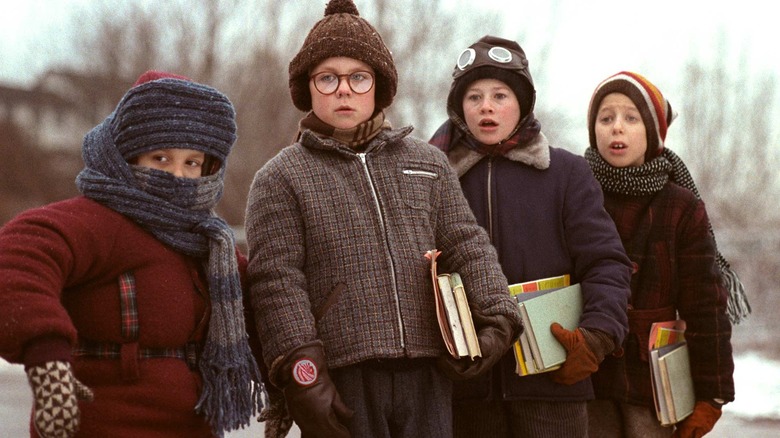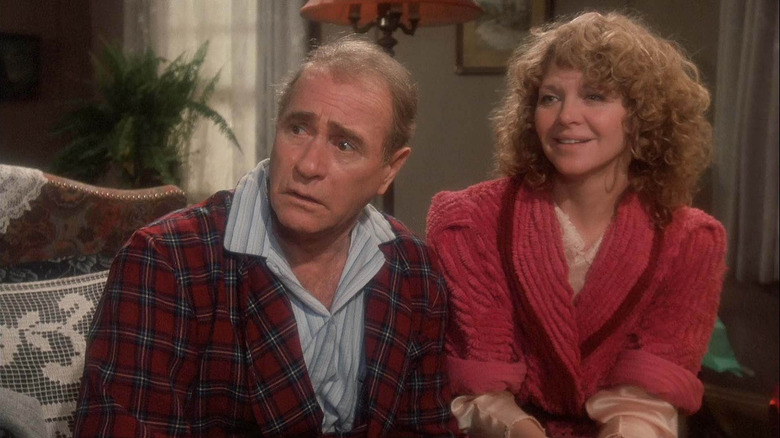A Christmas Story's Creator Didn't Necessarily See Ralphie As The Central Character
Although "A Christmas Story" was not a big hit when it first released in theaters in 1983, it's long since become one of the most famous holiday movies of all time. We can credit the TNT channel for this; in 1997 they started airing 24-hour Christmas marathons of the movie, and throughout the whole month of December "A Christmas Story" still plays on the channel seemingly every day. The TNT executives decided that everyone was going to learn to love this movie, whether they wanted to or not.
Of course, the movie would never have caught on as well as it has if it wasn't legitimately good. As /Film's own Demetra Nikolakakis put it, the reason it's so great is because it "chooses nostalgic realism over rose-tinted glasses." The movie is about an adult Ralphie reflecting on his childhood, and it never sugarcoats just how terrible so many parts of childhood are. Ralphie and his friends abandon a classmate with his tongue stuck to a frozen flagpole. Ralphie gets kicked down the slide by a mall Santa and his cranky elves. At one point Ralphie panics and falsely blames a classmate for telling him a swear word, and then we get to listen over the phone as the kid's mother beats the kid. Despite what the more schmaltzy Christmas movies will tell you, being a kid is actually pretty terrible most of the time, and the movie never shies away from that.
But for Jean Shepherd, who wrote the novel the movie was based on and helped write the screenplay, "A Christmas Story" wasn't really about Ralphie's childhood specifically. He may have been our point-of-view character, but the movie was more about Ralphie's family as a whole. If anything, the central characters were Ralphie's parents.
Mother and the Old Man
"I saw the Old Man in 'A Christmas Story' as a guy who grew up hustling pool games at the age of twelve and was supporting himself by the age of fourteen," Shepherd once said. "And Darren McGavin's sardonic attitude was exactly the characterization I had in mind."
When asked what he thinks happens with Ralphie's Old Man after the movie ended, Shepherd answered that he believed he would get a divorce and leave the family around the time of Ralphie's high school graduation. (Shepherd's father did a similar thing in real life.) As for the mother? Shepherd describes her as "the kind of woman I figure grew up in a family of four or five sisters and married young. She digs the Old Man, but also knows he's as dangerous as a snake."
Sounds depressing, but it's backed up by the movie itself; Ralphie's parents do love each other, but there are definitely problems between them that won't go away after the credits roll. Showed most clearly in the prolonged fight over the leg lamp, these two are rarely on the same page, and it's easy to imagine their marriage falling part completely years down the line.
Maybe this is why the recently-released sequel, "A Christmas Story Christmas," was so unremarkable. Ralphie's parents are (understandably) barely in it, and the movie doesn't follow through with Shepherd's vision of where they ended up. The impossibility of recapturing the couple's original dynamic is probably what doomed the latest sequel from the start. As Shepherd said about the original film: "In a way, the movie is really about these people, not Christmas or Santa Claus." Any follow-up movie without the parents is bound to feel a little hollow. You can read /Film's review of sequel here.

